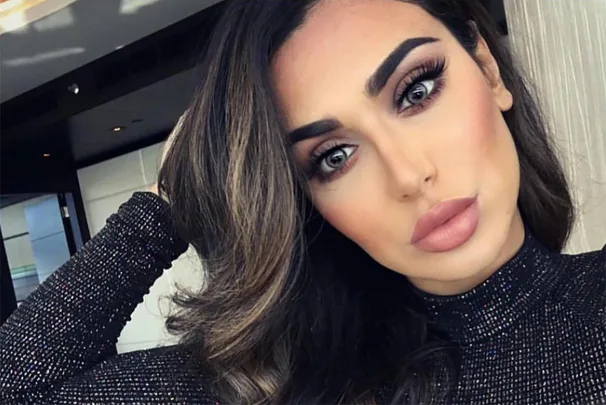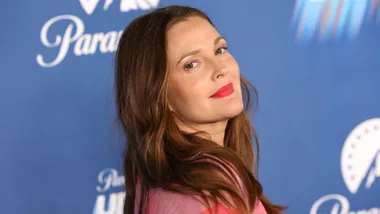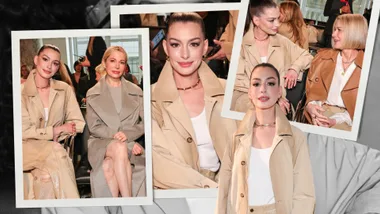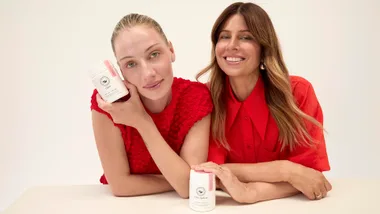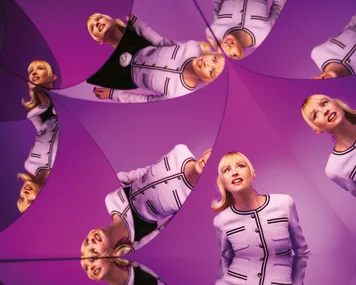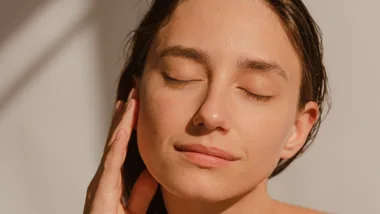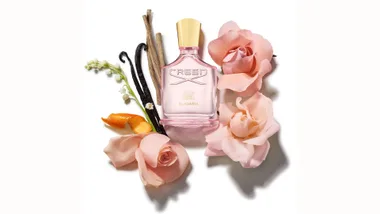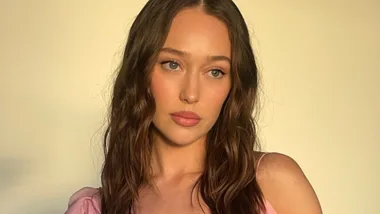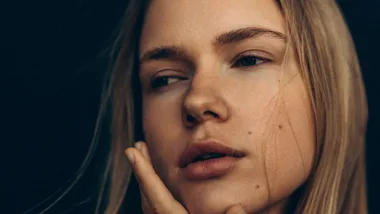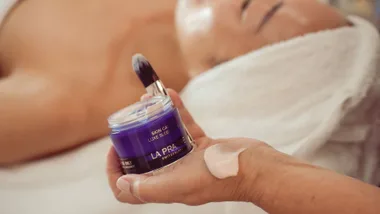Influencers from Amman to Dubai have adopted show-all, tell-all lives with a fevered passion, ushering in a new kind of celebrity culture in a region where women’s thoughts and wardrobe choices are often kept private.
“BONJOURRRRR! HOW ARE YOU, SNABIES?” Zain Karazon trills to her Snapchat followers on a grey morning in Amman, Jordan. She’s just completed her beauty routine: long, caramel hair expertly twisted into waves and fake eyelashes applied, giving her a doll-like appearance. Her outfit is a Yeezy-esque ensemble of black tights, boots and an oversize hooded denim tunic with distressed sleeves, printed with the words, “Where is my mind?” After posting a shot of her coffee, she grabs her two bedazzled iPhones and heads to a cafe, where she’s met by an army of teenage girls who chant her nickname, Zoozoo.
“When I was young, I wanted all people to know who I was,” says Karazon, 27. “Now, thanks to social media, I can say one thing and it reaches one million followers.” Her Snapchat, she says, is Zain TV, 24 hours a day. “Everyone knows me – even leaders and kings.”
Everyone may know Karazon, but they might not know what she does. She isn’t a conventional celebrity; rather, Karazon is one of a homegrown coterie of social media mavens in the Middle East bucking tradition and repressive laws to seek fame and fortune online. The women are not unlike their hashtagging counterparts
in the West, but the influencers here are forging their public profiles in a region much less comfortable with women showcasing their bodies and speaking their minds.
In addition to Karazon, there are the Abdel Aziz sisters – Alice, 29; Nadine, 26; and Farah, 24, in Beirut – who collectively have more than 1.5 million followers; Fouz Al Fahad, 28, a make-up artist in Kuwait with 2.4 million Instagram followers, and Sazdel El Kak, 29, a Lebanese TV and radio host, who works in Kuwait and has parlayed her social media success (345,000-plus Instagram followers) into a successful skincare clinic that launched last year.
Their lives are a seemingly endless stream of promoted products and party appearances, but they’re not just helping to shape the hottest looks of the season. They’re pushing the boundaries by talking about everything from love lives and body-shaming to child marriage, inspiring other women to chase different lives for themselves, too. “There are many people doing this for free things,” Alice Abdel Aziz says. “That’s not our goal. Our goal is to inspire people, and leave a mark.”
The rise of social media influencers in the Middle East began in a far-off yet familiar place: Calabasas, California. In 2012, after local TV started airing Keeping Up With the Kardashians, salons in the region noticed demand for a Kardashian-fuelled trend: contouring. “It freaked me out,” says Pierre Lahoud, a Lebanese make-up artist. “Women like to copy Kim Kardashian. They think she has that sexy look and Arabian curves” – referring to the family’s Armenian heritage – “and they have half of what she has.”
And it wasn’t just their looks: as the Kardashians became fully fledged moguls, women in the Middle East began pursuing similar branding opportunities. El Kak, who bears a striking resemblance to Kim, down to her long hair and penchant for bodycon dresses, was touted as a look-alike on local websites. “I thought, ‘That’s OK – they’re comparing me to a pretty girl,’” says El Kak, whose goal is to franchise her name to beauty ventures.
Motivation also comes from closer to home: Huda Kattan, 34, founder of the Dubai-based Huda Beauty, who amassed 25.6 million Instagram followers from her beauty tutorials. With a relatable tone (she’s written of being “blessed with super-hairy syndrome”) and a local approach (she often reviews false eyelashes, a wildly popular regional trend), she developed a devoted fan base. Kattan’s fame – and her classic Middle Eastern features – led to her own line of fake eyelashes at Sephora, and make-up artists clamour to be on her feed.
Fouz Al Fahad was one of them. The Kuwaiti make-up artist got a boost when one of her photos appeared on Kattan’s Instagram. “I love a strong woman who has it all,” declares Al Fahad, who is also a long-time fan of supermodel Cindy Crawford. She studied finance but was into make-up and began posting about it. Once she hit 7000 Instagram followers, she realised its potential and developed a signature look (her hair is a honey-toned mass of waves), which caught the attention of brands. She began travelling to events: a salon opening in Qatar, a launch in Dubai, a Carolina Herrera preview in Bahrain.
Soon, social media was taking over her life, but she had a day job as an admin assistant at Kuwait University. She wanted to quit, but her parents objected. “You don’t know what’s going to happen with social media,” they said. But the double life was exhausting: she’d finish work in Kuwait around 3pm, then fly to Dubai or Bahrain for events, return after midnight, and start her uni job at 7am. After a few months, she quit.
Al Fahad is now sought by brands trying to tap into the region’s market of make-up-obsessed women. Her manager declined to say how much she earns, but influencers in the region can charge, $500 to $10,000 for appearances, says Zayna Al-Hamarneh, CEO of Mode Marketing & PR in Jordan. Last year, Al Fahad was at Rihanna’s Fenty Beauty launch in New York and promoted jewellery at the Cannes Film Festival. At an event celebrating her M.A.C lipstick collaboration in Saudi Arabia, abaya-clad women crowded around her to take selfies. “I never thought social media could be this powerful,” she says. “Now, when I meet people, they get me flowers, iced coffee from Starbucks – it’s great.”
Perhaps none of these influencers know more about social media stardom than the Abdel Aziz sisters. They developed a taste for European fashion while visiting family in Romania (their mother is a Romanian homemaker; their father a Lebanese doctor). In 2012, Alice, the second-eldest (the eldest sister, Diana, lives in Nigeria with her own family), created an Instagram account, @styleinbeirut, and posted photos of her and her sisters’ outfits.
Soon, other fashion accounts began reposting the images, and the feed grew to more than half a million followers. The sisters started wearing local designers until they attracted the attention of global brands. Their big break came in 2015 with the premiere of The Sisters, a reality show about their high-flying lives. It drew comparisons to Keeping Up With the Kardashians and generated global press but was panned as boring (a spoof poked fun at their banal conversations) and ended after just one season.
The short run had little negative impact. Alice has since launched a line of sunscreen and tanning oil; Nadine has modelled for Guess and appeared on Lebanese Dancing with the Stars; and Farah has collaborated with Adidas. Social media is now a full-time job, netting them $500,000 last year. “We make good money,” Nadine says with pride.
Today, Nadine arrives at Métropole cafe in Beirut’s upscale Minet El Hosn neighbourhood wearing Céline sunglasses and an off-the-shoulder dress. Farah walks up in sweats, a tube top and Hermès flats; she looks around and notes how “everyone is in Mykonos these days”. Alice arrives late, takes in the heat and sweeps everyone inside to a table with aircon and a view. It’s clear she’s the leader.
The sisters insist on ordering desserts. “Pain perdu!” they exclaim, promising it’s the finest in Beirut. When it arrives, they film the server drizzling caramel over the dish, while Alice narrates into her phone, saying, “This is the best part!” as she posts to Instagram.
As they dig in, they bicker like, well, sisters. “I think people don’t know my romantic side,” Alice muses. “Yes they do, because you post about it!” Nadine interjects. They talk about boys: “It’s very important for a guy to be supportive of his girlfriend’s job,” says Alice, whose fiancé manages the trio. “We have to take pictures all the time and know how to deal with fame.” In any case, she says, men can’t really object, as “almost all girls are on Instagram”. The ideal man is smart, Farah says. “We should be able to have a conversation at the table.”
Being outspoken about equality in relationships is the kind of talk that gets the sisters noticed for more than fashion. Their Instagram posts – many snapped by their personal photographer – reflect the fact they live in a relatively free city, in a social class where they avoid many of the cultural restrictions governing other women. As a result, rather than playing nice with critics, the sisters are empowered to talk back. Alice has had fiery words about body-shaming for those who say she and her siblings are too skinny; in 2015, Farah corrected an interviewer who asked if the sisters were “scared to be taken for another Lebanese bimbo”.
“Lebanese women are not bimbos,” she said. “Whoever said a beautiful woman must be stupid?”
There are limitations – for example, they don’t collaborate with alcohol brands (“most of our followers are from Saudi Arabia and the Gulf”) – but that doesn’t stop them from posting selfies in bathrobes or hitting clubs in thigh skimming dresses. “We live in a society that will criticise no matter what,” says Nadine. “We’re in the 21st century and the world is changing,” adds Alice.
But the spread of selfie-driven Instagram culture is in stark opposition to the moral codes of the Middle East. Conservatives oppose how the popularity of social media is changing the region. At a 2016 Amman conference on families, guests from Palestine, Lebanon and Egypt discussed how social media was increasing moral degradation. In 2017, a famous Jordanian TV host launched into a diatribe on Facebook, calling on Jordanian women to “repent” for how they dress and saying they encouraged “prostitution, adultery and rape”.
Women defying conventions online have caught the eye of police, too. In 2016, a woman named Malak al-Shehri was arrested in the Saudi capital of Riyadh for tweeting a photo of herself walking without an abaya, which is the country’s dress code. Haya Awad, 35, a fashion designer in Amman with more than 80,000 Insta- fans, knows to tread carefully. “People following you online are really curious about your lifestyle, but, as a woman, I know my limits,’’ she says, recalling a time she posted a snap of a pair of ‘‘hot shorts’’ and a friend called her to complain, disgusted by their revealing nature.
Despite such critiques – and the risk of arrest – more women are sharing opinions on topics from feminism to cyberbullying. In January 2017, a Saudi woman tweeted that her infant daughter was being abused by the baby’s father (the baby was removed from him). Even in the region’s most conservative countries, women are posting photos of themselves from the neck down, or snapping their shoes or coffee cups. “I feel there’s a long way to go, but in the Middle East people are [now] more accepting that there are different kinds of girls and guys,” says Al Fahad.
The influencers are gratified by their impact. “Women tell me, ‘Because of you, we changed our life and started caring about ourselves, not only about brands and looks,’” says El Kak. Karazon thinks her outspoken approach has helped others find their voices. “When I started, it wasn’t possible for Jordanian girls to speak out on Snapchat,” she says. “I was the first woman to start talking about modern issues, and that made people start following me.”
What women such as Karazon have achieved is more than fame. Their success is what makes a teenager capture herself on Snapchat as she tells the world how she styled her headscarf, confident she has the right to do so. It’s a change that isn’t driven by a government – it’s real and organic, and it’s narrated 24/7, through filters and emojis.
